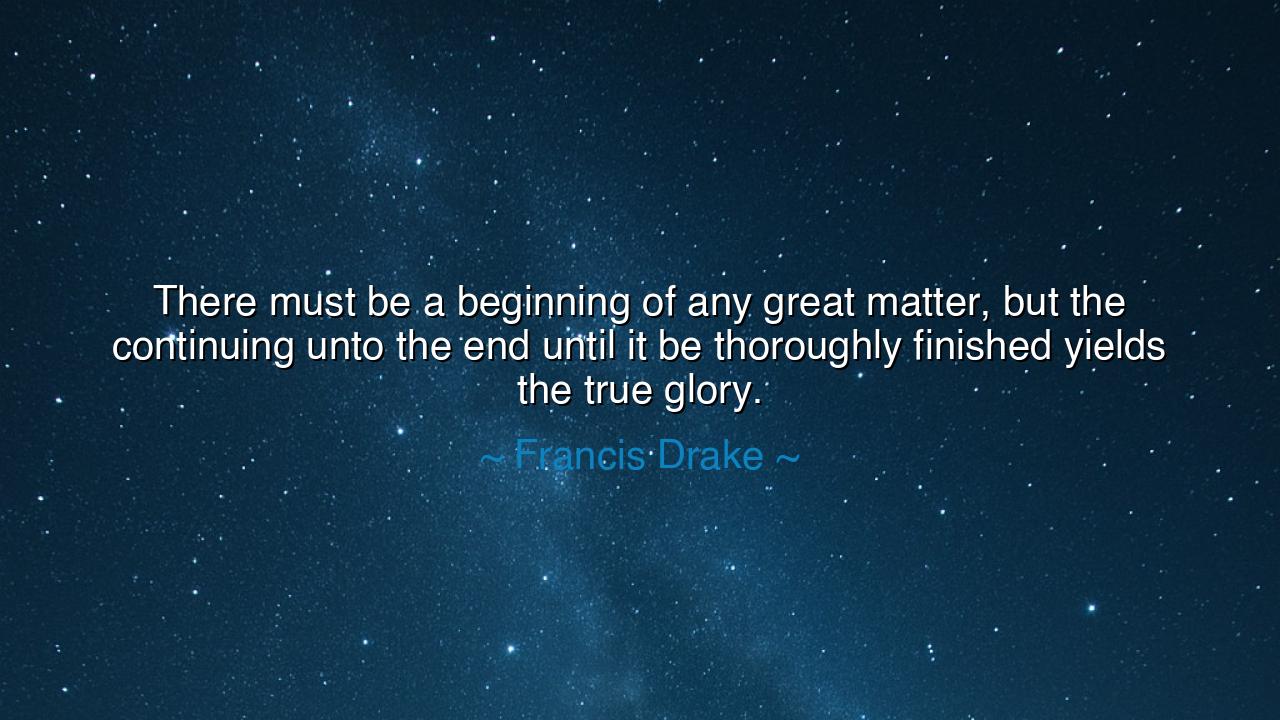
There must be a beginning of any great matter, but the continuing
There must be a beginning of any great matter, but the continuing unto the end until it be thoroughly finished yields the true glory.






The words of Sir Francis Drake — “There must be a beginning of any great matter, but the continuing unto the end until it be thoroughly finished yields the true glory” — stand as a beacon from the age of exploration, a testament to the spirit of endurance that conquers oceans, builds empires, and shapes destinies. Spoken by one of history’s most daring navigators, these words transcend their time, reminding all generations that greatness is not found in the spark of ambition, but in the flame of perseverance that burns until the work is complete.
Drake was a man who knew the perilous dance between beginning and completion. Born into humble origins, he rose to command fleets and circumnavigate the globe — a feat nearly unthinkable in the sixteenth century. When he uttered these words before embarking on his legendary voyage, he was not merely speaking of ships and sails, but of the eternal law that governs all achievement: that beginnings are common, but finishing well is rare. Many dream, few endure. The world is filled with abandoned beginnings, but glory belongs only to those who finish the course, who stand unbroken when others have turned back.
Consider the nature of beginnings — how bright, how intoxicating they are. Every man can begin with enthusiasm, for beginnings require only vision and courage. But to continue “unto the end” requires another strength entirely: the discipline of the soul, the patience to persist through storms and doubt. In every great endeavor, there comes a moment when the dream turns to labor, when the sea turns rough, and the heart must decide whether to yield or to press on. It is in this crucible of persistence that greatness is born.
History offers many who have lived Drake’s truth. Thomas Edison, whose thousand failed attempts birthed the electric light, understood that the beginning of invention is curiosity, but its completion is endurance. Michelangelo, who labored four years upon the ceiling of the Sistine Chapel, endured solitude, pain, and exhaustion so that his vision could be “thoroughly finished.” These men, like Drake, did not find glory in the idea, but in the completion — for it is the finishing stroke that turns labor into legacy.
Drake’s own voyage around the world embodied his creed. He faced mutiny, disease, and endless danger, yet his resolve never wavered. Where lesser men would have sought safety, he sought completion. When at last his ship, the Golden Hind, returned to England, it was not the treasure he brought home that made him immortal, but the proof that human will could master the impossible. His triumph was not in beginning the journey — many had begun such voyages — but in ending it when so few had survived to tell the tale.
This truth extends far beyond the sea. In the voyage of every life, there are beginnings that call with promise — a new craft, a cause, a love, a purpose. But the measure of a soul lies not in how it begins, but in how it endures. The world forgets those who start well and falter; it remembers those who finish despite despair. For the gods themselves, it was said, honor not the first flame, but the fire that endures through the night.
Let this then be the lesson: do not glorify beginnings, but honor endurance. Begin bravely, yes — but continue when the wind dies, when the world forgets, when your own heart grows weary. For in the act of finishing, the spirit transcends failure, and mortal effort touches the eternal. As Sir Francis Drake teaches across the centuries, true glory belongs not to those who begin the voyage, but to those who see it through to the end — who, through storm and silence alike, refuse to abandon the helm until their purpose is complete.






AAdministratorAdministrator
Welcome, honored guests. Please leave a comment, we will respond soon